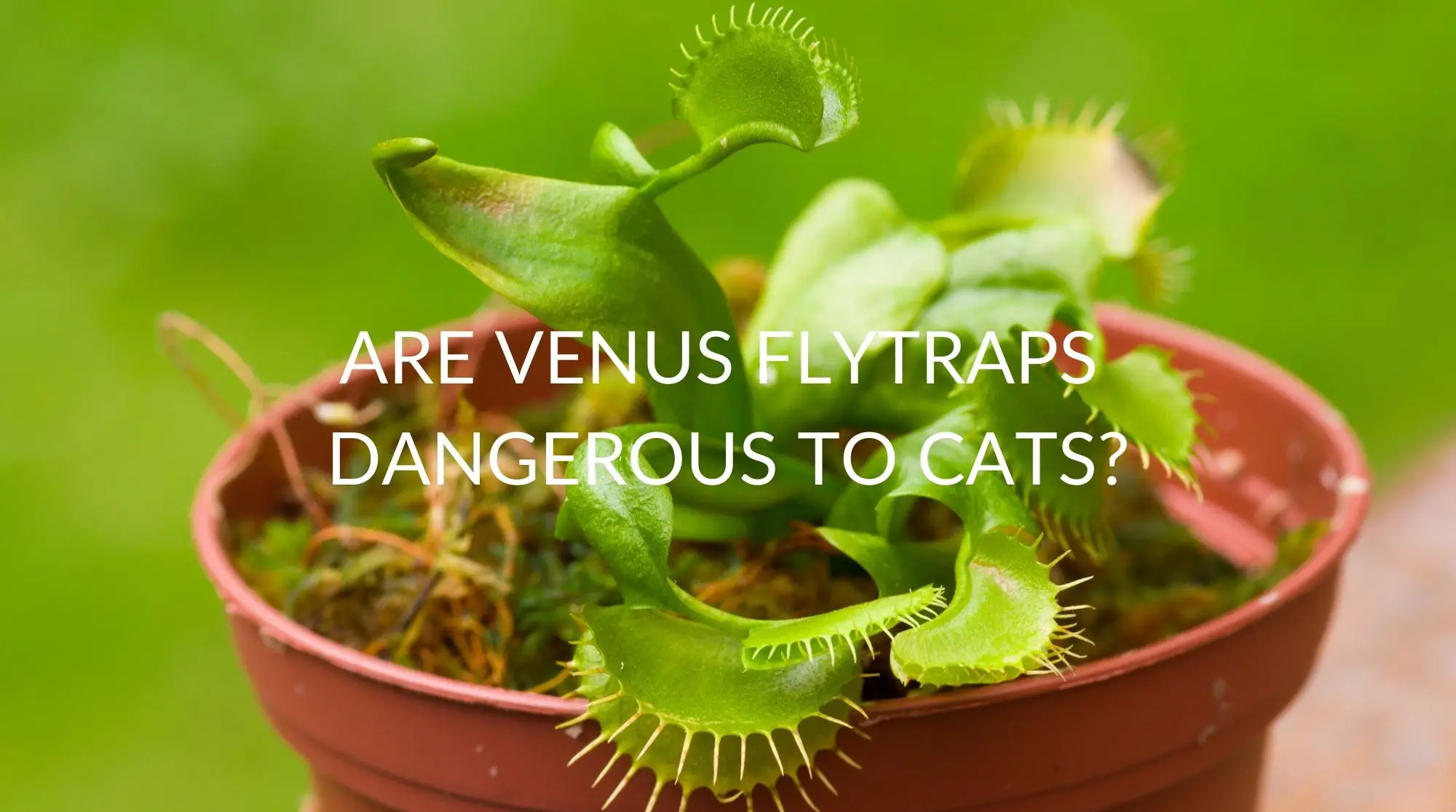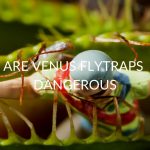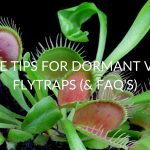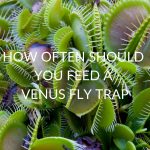Venus flytraps are not considered dangerous to cats. The plant is non-toxic, there are no thorns, and it cannot digest mammals. Even though this plant is not harmful, cats should not eat this plant regularly. It is a great, safe asset in the home because of how easily it removes house spiders, flies, and other bugs. But, in large quantities, it can cause problems.
This article discusses how Venus flytraps can be dangerous to your pet. Continue reading to learn how Venus flytraps can be problematic for your cat’s health.
Are Venus Fly Traps Dangerous?
The Venus flytrap is generally a safe plant because it is non-toxic and easily capable of detecting the difference between edible bugs and inedible objects, like felines. The Venus flytrap is a relatively gentle plant with no thorns to harm your cat. The plant will not close around objects like cat paws or other parts of a cat’s body because the trap will recognize they are indigestible.
According to ASPCA, Venus flytraps are non-toxic to house pets like cats. Consuming a Venus flytrap will not cause your cat harm, meaning you can safely keep these plants in your household.
Venus flytraps will not physically harm your cat if they touch the trap. It is much more likely for your cat to hurt your plant than the other way around. There are no thorns on the stems. However, a pet that plays too much with a Venus flytrap can cause problems for the plant. Traps that are activated too many times will die.
Are Venus Flytraps A Danger To My Pets?
Venus flytraps are not dangerous to pets. They are harmless plants that are great for capturing house spiders, gnats, flies, and other annoying bugs. The plant closes slowly, giving pets time to move before trapping them inside. Plus, the jaws are too weak to trap any parts of the animal inside.
The Venus flytrap is a non-toxic plant that will not poison your pet unless there are additional chemicals on it. Non-toxic plants are a great option if your cat is a notorious plant-eater because they are non-toxic and they do not have barbs or thorns.
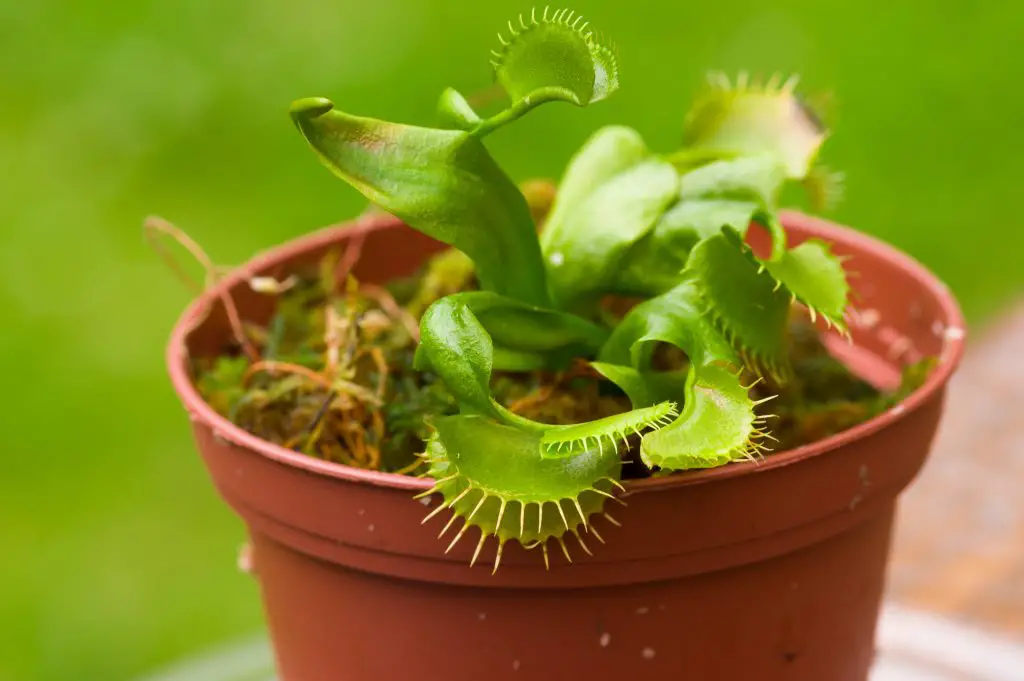
Gentle
The Venus flytrap shuts slowly and easily recognizes its digestible prey from others. Pets who like to interact with Venus flytraps will not get harmed by the plant, even if the trap shuts on them. In other words, if your cat tampers with the traps, they will not hurt their paws.
Furthermore, there are no thorns on the stem, so it is not sharp. For the most part, your cat can eat the stem without hurting its mouth.
Non-toxic
The Venus flytrap is non-toxic, meaning your cat can consume the plant without being poisoned. Your cat will not get sick by eating a flytrap. Cats should never eat large quantities of Venus flytraps, or they will get sick. Remember that spraying pesticides on your venus flytrap will make it inconsumable. These chemicals are poisonous and make consuming the flytrap highly dangerous for your cat.
Can Carnivorous Plants Hurt Cats?
Physically, carnivorous plants will not hurt your cat. They are attracted to insects and not felines. If your cat plays with your Venus flytrap, it can activate the trap. However, the trap will not commence digestion once it realizes your cat is inedible. The Venus flytrap waits several seconds before closing the trap entirely, waiting for small or inedible insects to escape. If they detect something inedible, it will reactivate its trap by opening its mouth and releasing the thing clasped inside.
Venus flytraps are small plants that cannot digest anything larger than small insects. Even when a kitten is newborn, carnivorous plants like the Venus flytrap are too small to digest a cat. Venus flytraps can only harm your cat if they are allergic or ingest a large amount of the plant. They can also harm your cat if they eat poison-covered leaves.
You must be careful if you want to keep a Venus flytrap in your household. Avoid using pesticides on your Venus flytrap, or you risk endangering your cat’s health. Always supervise your cat when they are near plants. Even cats who never play with plants can become active around unfamiliar plants, especially moving plants like the Venus flytrap.
What Happens If A Cat Eats A Venus Fly Trap?
Your cat will probably be fine if they eat a Venus flytrap. However, it would help to observe your cat’s behavior and take it to the emergency veterinarian if you notice any symptoms of illness or strange behavior. Digestion upset is a common occurrence in cats that eat food outside their diet. If your cat eats a venus flytrap, it may need veterinary treatment for its upset stomach.
Taking your cat to the emergency vet can give you additional comfort after ingesting a venus flytrap. The vet will run blood tests, perform a physical examination, and check for other abnormalities to guarantee they are not in any danger.
Allergic Reactions
Although it is uncommon, some cats are allergic to Venus flytraps. You should never dismiss the possibility of your cat having an allergic reaction after eating the carnivorous plant. By taking them to the vet, you can ensure they are. If your vet determines your cat has an allergic reaction, they will treat them accordingly. You should also avoid letting your cat come in contact with any venus flytraps in the future.
Poisoning
Chemical poisoning is the unfortunate result of ingesting Venus flytraps covered in pesticides. Ingesting any Venus flytrap covered in chemicals can severely harm your cat’s health. You should take them to the veterinarian immediately if you notice dizziness, seizures, or other signs of illness. Lab tests can confirm no toxic chemicals infected the plant. Therefore, your cat may get proper treatment and return home safely.
Food Poisoning
Eating too many Venus flytrap plants can cause a cat to become physically ill, creating food poisoning or gastrointestinal upset. When cats get upset stomachs, they turn to grass to regurgitate their food. Venus flytraps closely resemble grass, often confusing domestic (and wild) cats. Your cat may remain in severe pain until they get treatment.
Recap
Venus flytraps are typically harmless to cats. The average house cat can coexist peacefully with these plants since they have the same objective of catching house flies and other bugs. The only time a Venus flytrap poses a threat to your cat is when they have pesticides or when your cat is allergic to the plant. You should seek emergency veterinary attention immediately if you notice any strange behavior after your cat eats Venus flytraps.
Unfortunately, outdoor cats can be vulnerable to consuming poisoned plants. If you have an outdoor cat, consider maintaining your yard or communicating with your landscapers that you do not want pesticides used on any plants. A venus flytrap covered in pesticides or other poison can be dangerous to your cat.
Since you will not spray your plant with pesticides, the Venus flytrap will not poison your indoor cat. However, outdoor plants are much likelier to have pesticides and other poisons. You may accommodate your pet’s needs by never using pesticides and observing their behavior after eating the plant. If their behavior changes or they begin showing any signs of illness, take them to the vet immediately.

